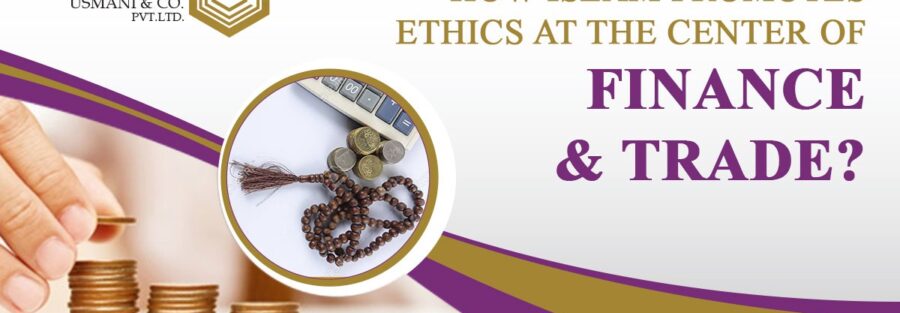The Influencers
Ethical finance/trade implies a socio-economic impact on stakeholders in investment and trade activities. Ethical movement promotes fair trade, distribution of wealth, impartial investment and most importantly corporate social responsibility. More and more financial institutions are trying to incorporate ethical considerations into their strategic decision making as Ethical Financing is growing exponentially due to the changes in consumer behaviour. Factors such as Consumer Protection Law, Trade description Act and other legal constraints are being imposed on financial institutions so that they meet the minimum ethical benchmarks.
Pressure groups have vigorously opposed anti-human policies and debt burdens on developing countries too. People tend not to consider religion (particularly Islam) as a factor influencing ethics in finance. In fact, ethics is the most important factor to be considered during transactions according to Islam because the general objective of “Ethical Financing” and “Distribution of Wealth in Islam” both encompass similar norms of honesty, integrity, impartiality and justice etc.
Outline the Objectives
It is important to be well aware of the concept of wealth in Islam in order to distinguish between capitalism and socialism plus how Quranic interprets fairness, justice, righteousness and social responsibility. This is what ethical finance/trade has been propagating over the past two decades.
According to the Holy Quran, wealth in all possible forms is a property of Allah and He has delegated the right of property over a thing, which accrues to man. The Holy Quran says, “Give to them from the property of Allah which he has bestowed upon you.” [24:33]
The monastic approach of capitalism affirms that a man has an absolute and all unconditional right on private property. On the flip side, socialism totally denies the right to private property. In Islam, there is a clear line which indicates that a man has a right on private property but it is not considered an unconditional and absolute right that is bound to cause “Disorder on Earth”. As the Holy Quran says,
“And Seek the (betterment of the) Ultimate Abode with What Allah has given to you, and do not neglect your share from this world, and do good as Allah did good to you (by granting these properties to use ), and do not seek to make mischief in the land.” [28:77]
Establish the Ethics
In order to minimise injustice, unfairness, chaos among traders (مفضی الی المنازعہ ) and inequality, Islam has outlined certain basic principles of finance and trade as well as imposed restrictions on certain kinds of activities in trade (which often lead to inequality and chaos among traders).
The Core Principles
Gharar: According to the Islamic laws, all parties involved should be completely aware of the transaction they are going to execute and there should not be any ambiguity with regards to any term of the contract or the capacity of any party in relation to the execution of the contract. Hence, selling of goods without proper possession is forbidden by Allah’s Apostle, as mentioned in Sahih Muslim “He who buys food-grain should not sell it until he has taken possession of it.” [Book 10: 3640]. This is why many such transactions involving such risks of ambiguities are not allowed by Islamic laws (Shariah), like a short sale, speculative transactions, futures and forwards, derivatives, sale of debt and options etc.
No investment or slightest involvement in prohibited businesses or activities. The Holy Quran says,
“And, O my people, give full measure and weight justly, and defraud not men of their things, and act not corruptly in the land making mischief. What remains with Allah is better for you, if you are believers.” [11: 85-86]
*Interest-free: Interest or Riba will not be given or taken under any circumstances in the light of Quran and Sunnah.
“Ibn Mas’ud says that the Prophet (PBUH) cursed the consumer of riba and the one who feeds it and the one who witnesses it and the one who documents it.” [Ibn Maja: 2277]. .
This interest was also prohibited in other heavenly religions (Christianity, Judaism) as mentioned in the old testaments of the Bible. The rationale is to protect men from greed, unfair exploitation and concentration of wealth in very few hands.
Gambling and insurance is prohibited in Islam. Allah (SWT) says, “O who you believe! intoxicants (e.g. alcohol) and gambling and idols and (lottery by) arrows are an abomination of Satan’s work, so avoid them so that you may get salvation” [Quran 2:219]
Islam promotes equality, justice and fairness in trade plus advocates the concept of sharing of profit, loss and risk proportionally among all the involved parties. The activities which are impermissible according to Islam (as mentioned above) are also considered as “Immoral Activities” among pioneers of ethical finance/trade. These activities are the main cause of “Disorder on Earth” and “Unequal Distribution of Wealth”.
The Ultimate Benefit
It is then significant to place Islamic ethics at the nucleus of finance/trade. These should be used as parameters by the society to establish an economy based on agreed-upon norms, values and virtues. This would not only produce a moral economic system serving the needs of Muslims but also humanity at large where these fundamental objectives are met.
Written by: Jareer Usmani




1 Comment
Abdul Wahab
A very informative article, really inspired. Masha’llah